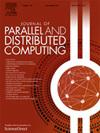Federated multi-task learning with cross-device heterogeneous task subsets
IF 4
3区 计算机科学
Q1 COMPUTER SCIENCE, THEORY & METHODS
引用次数: 0
Abstract
Traditional Federated Learning (FL) predominantly focuses on task-consistent scenarios, assuming clients possess identical tasks or task sets. However, in multi-task scenarios, client task sets can vary greatly due to their operating environments, available resources, and hardware configurations. Conventional task-consistent FL cannot address such heterogeneity effectively. We define this statistical heterogeneity of task sets, where each client performs a unique subset of server tasks, as cross-device task heterogeneity. In this work, we propose a novel Federated Partial Multi-task (FedPMT) method, allowing clients with diverse task sets to collaborate and train comprehensive models suitable for any task subset. Specifically, clients deploy partial multi-task models tailored to their localized task sets, while the server utilizes single-task models as an intermediate stage to address the model heterogeneity arising from differing task sets. Collaborative training is facilitated through bidirectional transformations between them. To alleviate the negative transfer caused by task set disparities, we introduce task attenuation factors to modulate the influence of different tasks. This adjustment enhances the performance and task generalization ability of cloud models, promoting models to converge towards a shared optimum across all task subsets. Extensive experiments conducted on the NYUD-v2, PASCAL Context and Cityscapes datasets validate the effectiveness and superiority of FedPMT.
跨设备异构任务子集的联邦多任务学习
传统的联邦学习(FL)主要关注任务一致的场景,假设客户端拥有相同的任务或任务集。但是,在多任务场景中,由于操作环境、可用资源和硬件配置的不同,客户机任务集可能会有很大差异。传统的任务一致性FL不能有效地解决这种异质性。我们将这种任务集的统计异质性定义为跨设备任务异质性,其中每个客户端执行服务器任务的唯一子集。在这项工作中,我们提出了一种新的联邦部分多任务(FedPMT)方法,允许具有不同任务集的客户端协作并训练适合任何任务子集的综合模型。具体来说,客户端部署针对其本地化任务集定制的部分多任务模型,而服务器利用单任务模型作为中间阶段来解决由不同任务集引起的模型异构性。通过它们之间的双向转换,促进了协作培训。为了缓解由任务集差异引起的负迁移,我们引入任务衰减因子来调节不同任务的影响。这种调整增强了云模型的性能和任务泛化能力,促进模型向跨所有任务子集的共享最优收敛。在NYUD-v2、PASCAL Context和cityscape数据集上进行的大量实验验证了FedPMT的有效性和优越性。
本文章由计算机程序翻译,如有差异,请以英文原文为准。
求助全文
约1分钟内获得全文
求助全文
来源期刊

Journal of Parallel and Distributed Computing
工程技术-计算机:理论方法
CiteScore
10.30
自引率
2.60%
发文量
172
审稿时长
12 months
期刊介绍:
This international journal is directed to researchers, engineers, educators, managers, programmers, and users of computers who have particular interests in parallel processing and/or distributed computing.
The Journal of Parallel and Distributed Computing publishes original research papers and timely review articles on the theory, design, evaluation, and use of parallel and/or distributed computing systems. The journal also features special issues on these topics; again covering the full range from the design to the use of our targeted systems.
 求助内容:
求助内容: 应助结果提醒方式:
应助结果提醒方式:


